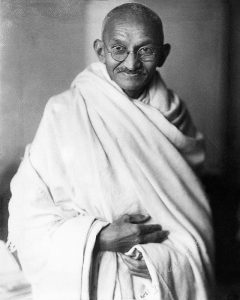
È in un discorso tenuto il 14 aprile 1919 davanti ai cittadini di Ahmedabad, in risposta a violenti atti di protesta occorsi nei giorni precedenti, che Gandhi insistette particolarmente sulla necessità di abbracciare una visione pacifica della disobbedienza civile. “Se coloro che non hanno avuto parte in questi eventi si fossero tutti, coraggiosamente, fatti avanti per impedire gli incidenti, la folla si sarebbe immediatamente resa conto dell’errore che stava facendo. Oso dire, se invece che cedere il proprio denaro alla folla per paura, si fosse scesi in strada per proteggere le case e salvare gli innocenti, senza temere la morte, si sarebbe ottenuto esattamente questo risultato. Finché non avremo questo coraggio, i rivoltosi riusciranno sempre a intimidirci e forzarci a partecipare ai loro atti violenti. Il timore della morte ci priva di valore e di sentimento religioso. Perché il desiderio di valore è il desiderio di spiritualità. Non avendo fatto che poco per mettere fine alla violenza, siamo tutti colpevoli per i peccati che sono stati commessi.”
Gandhi
In a speech given on the 14th of April 1919 to the citizens of Ahmedabad, in response to the violent outbreak of the protest in the previous days, Gandhi stressed the need to embrace the methodology of nonviolent protest and civil resistance. “if such as those who were no party to these deeds had all courageously and bravely gone forward to put down the lawlessness, the mob would have been checked in their career and would have immediately realised the wickedness of their doings. I venture to say that, if instead of giving money to the mob out of fear, we had rushed out to protect buildings and to save the innocent without fear of death, we could have succeeded in so doing. Unless we have this sort of courage, mischief makers will always try to intimidate us into participating in their misdeeds. Fear of death makes us devoid both of valour and religion. For want of valour is want of religious faith. And having done little to stop the violence we have been all participators in the sins that have been committed.”
Commenti